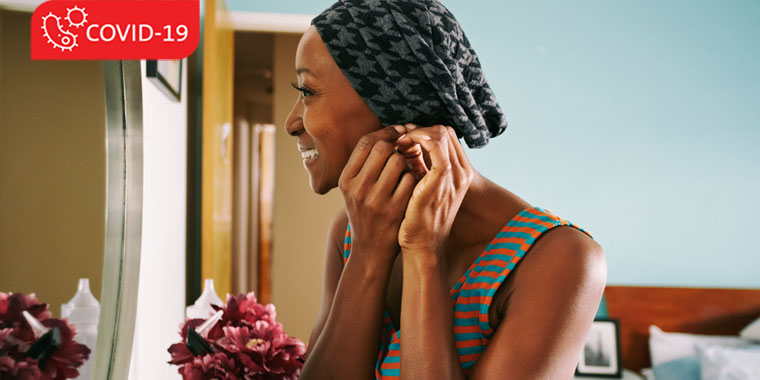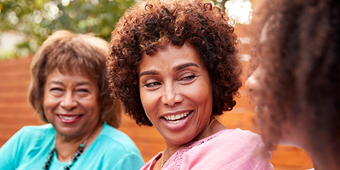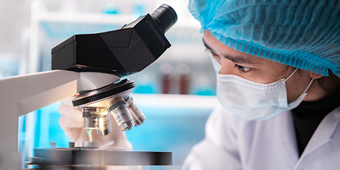COVID-19 And Cancer: Implications For Patients

Find Your Perfect Match
Answer a few questions and we'll provide you with a list of primary care providers that best fit your needs.
Facing a cancer diagnosis is an enormous challenge under the best of circumstances. When you add in a global pandemic, the physical and mental stressors compound.
Medical oncologist Mark Marinella, MD, FACP, from Dayton Physicians Network, provided insights to Premier Health Now about how people with cancer can best take care of themselves during the COVID-19 (coronavirus) outbreak.
Immune System Challenges
“For people with cancer, there are both disease-related and treatment-related risks of getting the virus or having more serious complications from the virus,” Dr. Marinella explains.
He treats all types of cancer and says people with blood cancers – leukemias, lymphomas, and multiple myeloma – are at the greatest risk concerning coronavirus because these cancers carry an immune system defect with them, and the drugs used to treat them can cause immune suppression. Even in remission, people with blood cancers may have a higher risk of contracting the virus or having serious complications.
People actively receiving cancer treatment also need to consider the effects of a weakened immune system, potentially worsening the effects of COVID-19.
For people who have recovered from solid tumors like breast or colon cancer years ago, Dr. Marinella says their immune systems should be intact, and they probably are not at greater risk of experiencing the virus and its complications.
Taking Extra Precautions
Both Dr. Marinella and the National Cancer Institute recommend steps people with cancer can take to avoid getting COVID-19 and possible serious complications of the virus. The guidelines are similar to suggestions for the general population, but even more critical to follow.
Avoid:
- Crowds
- Smoking
- Excessive alcohol
- Touching your mouth, nose, and especially eyes (a gateway for coronavirus infection)
- Handshaking
- Having visitors if you are in active treatment
- Non-essential travel
Choose to:
- Wash hands frequently
- Wipe down hard surfaces often, especially door handles, faucet handles, and any stainless steel or plastic surfaces
- Keep several weeks of medication and supplies on hand in case you need to stay home for prolonged periods of time
- Eat a healthy, plant-based diet
- Exercise
- Consider wearing a mask if you have to go out in public places
He recommends that family members and friends stay away if they have a cough, respiratory symptoms, or unusual symptoms like loss of taste or smell.
How Medical Offices Are Adapting Care
To keep people with cancer at home as much as possible, Dr. Marinella says he and other physicians are changing cancer treatment regimens from IV to oral doses whenever appropriate.
“We are minimizing trips in and out of the house for people,” he explains. “When we can, we’re lengthening the amount of time between treatments, for example, treating every four weeks instead of every three weeks.”
Other measures include avoiding steroids, which can deplete the immune system, and using telehealth visits when possible.
For those who do come in for their cancer treatments, he says, “Don’t panic if you have to come in for treatment.”
Medical facilities are taking lots of precautions. Miami Valley Hospital South, where he sees patients, is screening people for fever at the hospital entrance. Nurses, doctors, and phlebotomists are wearing masks to minimize spread of infection. Reduced schedules have eliminated crowds.
Staying Mentally Strong
“Cancer is stressful enough on its own, plus now we have the pandemic,” Dr. Marinella says. “I would suggest that people avoid watching too much news on television and radio.”
He recommends staying connected with friends, family, a faith group, or other groups through Zoom or similar video platforms. Dr. Marinella encourages getting outside when it’s sunny and walking around your yard or neighborhood. Watch funny shows, read a book, or pursue a hobby.
Family members can help by supporting their loved one emotionally, bringing meals, and keeping a positive attitude.
"I’ve seen a lot of toughness in my patients,” Dr. Marinella comments. “I haven’t seen people shrinking back from their treatment. They’ve been pretty positive. I’ve been amazed.”
Find Your Perfect Match
Answer a few questions and we'll provide you with a list of primary care providers that best fit your needs.
Source: Mark Marinella, MD, FACP, medical oncologist with Dayton Physicians Network; National Cancer Institute





